Ed Wolfrum - Detroit Sound','Ed Wolfrum by Rob Moss
Aticle Photo: Detroit from the river 1966
The emergence of Detroit as a major music centre in the early 1960s has as much to do with technological expertise and sophistication, as it did with artistic creativity, musical talent or social migration. Yet, the coalescence of such a wide variety of highly skilled musicians, technicians, performers, engineers, entrepreneurs, composers and associated artisans all meeting at the same time, in the same place created a unique collusion that resulted in a period of unprecedented financial and artistic success for the city. The idea that the bulk of this wealth was created by popular music success alone however, is misleading. Selected Detroit studios became industry leaders in the production of motion picture sound tracks, industrial and military film audio, radio jingles, commercials and much more, in a local, national and international marketplace. They were fuelled by a small band of highly talented musicians and technicians who provided an unparalleled level of ingenuity, innovation and abstruse ability. A number of sound engineers, what today would be called "old school", created recording equipment, audio phonic practices and reproduction techniques that revolutionised the industry and elevated Detroit to the very peak of cutting edge electronic sound production in America. The environment that spawned such a technological transformation had its roots in the automobile industry, with its solid engineering base and huge employee reserve, and the rich manufacturing traditions of the Mid West. Historically, Michigan boasted a long and illustrious record as a musical manufacturer, having been the largest producer of sheet music prior to World War II, the biggest generator of player pianos (precursor to phonograph) in the entire 20th century and home to one of the top microphone makers in the country. A burgeoning population in the city not only provided a plethora of performers and players to render the rondos, but also presented a customized consumer base that would drive and deliver commercial success. 'Roll tape'
One important individual in this entire scenario began his professional career in 1961, at 14 years of age, 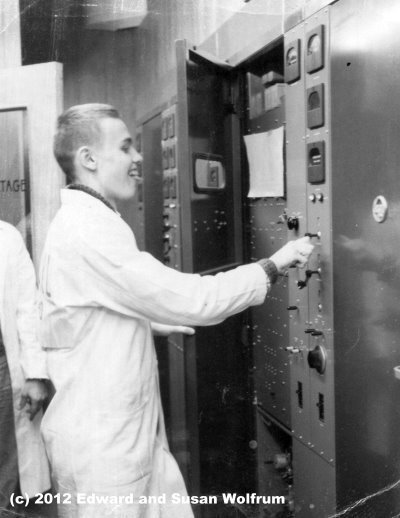 servicing, maintaining and building studio equipment at one of the numerous Detroit radio stations WEXL and later WXYZ. His creative genius played a crucial role in the subsequent success and celebrity of the recording industry in Detroit and led him to international acclaim and professional recognition. Doctor Edward J. Wolfrum worked at Motown, Golden World, United Sound Studios, Terra Shirma, Theme Productions plus many other smaller studios, throughout the 1960s and 1970s and in the opinion of this writer is one of the most important sound engineers in the country. Yet it was the invention of a single piece of equipment that catapulted his name and reputation onto the local recording scene, as Wolfrum recollected. " When I was 16 I designed and built something I called a 'Direct box' while I was working at WEXL. Basically, it allowed consumer quality sound gear to interface with professional audio equipment which considerably enhanced the quality of the finished product. I used it to interface the audio gear of local groups to the audio systems at halls for record hops, which made them sound much better. A lot of other groups heard the sound and wanted to use me to record them " One of his recordings, on a group called The Bishops, reached the local record charts and considerably enhanced his reputation with studio bosses. " At one of the hops I met Devora and Frank Brown, who owned and operated Fortune Records. Frank bought a 'Direct Box' from me for his studio and suggested I take it to United Sound Studios and some of the other big studios in town. I knew United's work from the commercials they sent to the radio station. The boss was Jimmy Syracuse. He bought three 'Direct Boxes' from me."
servicing, maintaining and building studio equipment at one of the numerous Detroit radio stations WEXL and later WXYZ. His creative genius played a crucial role in the subsequent success and celebrity of the recording industry in Detroit and led him to international acclaim and professional recognition. Doctor Edward J. Wolfrum worked at Motown, Golden World, United Sound Studios, Terra Shirma, Theme Productions plus many other smaller studios, throughout the 1960s and 1970s and in the opinion of this writer is one of the most important sound engineers in the country. Yet it was the invention of a single piece of equipment that catapulted his name and reputation onto the local recording scene, as Wolfrum recollected. " When I was 16 I designed and built something I called a 'Direct box' while I was working at WEXL. Basically, it allowed consumer quality sound gear to interface with professional audio equipment which considerably enhanced the quality of the finished product. I used it to interface the audio gear of local groups to the audio systems at halls for record hops, which made them sound much better. A lot of other groups heard the sound and wanted to use me to record them " One of his recordings, on a group called The Bishops, reached the local record charts and considerably enhanced his reputation with studio bosses. " At one of the hops I met Devora and Frank Brown, who owned and operated Fortune Records. Frank bought a 'Direct Box' from me for his studio and suggested I take it to United Sound Studios and some of the other big studios in town. I knew United's work from the commercials they sent to the radio station. The boss was Jimmy Syracuse. He bought three 'Direct Boxes' from me."
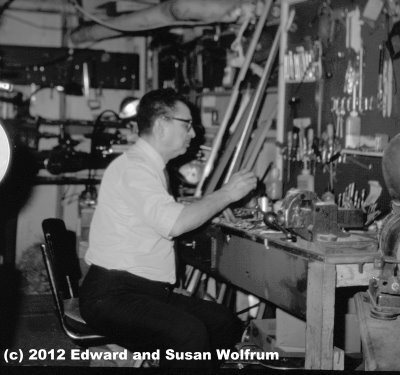
Jimmy Syracuse in United Sound Studio shop
Wolfrum's tenure at WXYZ came to an abrupt end in 1964 when ABC bought the station and summarily fired the entire talent and technical staff. "I wasn't out of work for long though because WOMC another radio station recruited me to assist in the installation of an FM stereo transmitter they were putting in. It was the first FM stereo radio station in Detroit. That's where I first met Mike McLean when he came by to see the new stereo station. He invited me to come over to Motown to see what they were doing. Ron Malo, his predecessor at Motown bought a 'Direct Box' from me so he knew what I could do. I knew many of their acts from the record hops so felt quite comfortable going in. Once he'd shown me around he made me an offer to work there which I said I would think about, but as I was leaving Berry Gordy approached me and said 'Mary Wilson told me about you. Why don't you come and work for us.' This sweetened the pot so I accepted. I was 18." In March 1965 Ed Wolfrum became a Motown Records employee.
He joined a technical staff that was responsible for recording sessions, maintenance, disc cutting, building and developing new equipment and various other engineering duties. "When I first went in I did a lot of recording with people like Stevie Wonder, Marvin Gaye, Martha and the Vandellas, Kim Weston, Supremes. Well, pretty well all their artists really. It was all very exciting because the company was so hot and many of the sessions we did became big hits. I got to work with all the musicians too. They were great. Probably the best group of guys I ever worked with, particularly the rhythm section. People like James Jamerson, Benny, Uriel, Earl, Eddie Willis, Joe Hunter and all the Funks. You could give them a new tune and they would pick it up so quickly.
When I first came in I enjoyed it and found it quite challenging. But then the responsibilities became divided between the recording and technical sides and we had two bosses. McLean was our technical boss and Lawrence Horn was in charge of recording. I wasn't comfortable with this because I felt like I was being pulled in two different directions... and I wasn't learning too much either. I also had trouble working with Mike McLean. Call it a clash of cultures." Wolfrum's immersion in the Catholic faith had always exerted a major influence on his philosophy and spirituality. " I have always been strongly driven by my faith and during this time (at Motown) I felt a tremendous pull to dedicate myself to the priesthood, so I left the company and entered the Seminary." He spent almost four years there yet returned in the summers to work in the studio. "During that first summer in '65, I approached Bob D'Orleans at Golden World to sell him a 'Direct Box'. He bought two, but, more importantly, introduced me to Joanne Bratton and she introduced me to Ed Wingate. They knew who I was from my time at Motown and in radio. Mr. Wingate asked me if I'd like to work with Bob D'Orleans at Golden World and I jumped at the chance. Bob and Ken Hammond had built the Golden World studio from ground up. He took me under his wing and taught me a lot. As a recording engineer he was way ahead of his time and was far superior to anyone at Motown. He was strict though. I thoroughly enjoyed working with him, especially when it came to recording and re mixing.
The first session I worked on was with the Sunliners, a pop group that contained Ralph and Russ Terrana, who would later become a sound engineer. Ralph would later open Terra Shirma studio."
Ed Wolfrum's jump into the big league as a sound engineer at Golden World, came in 1966 as he fondly recalls. "Columbia Records had booked time for some of their projects, people like Johnny Mathis, Tony Bennett, Kenny Rankin and Andy Williams. I got a call from Joanne one day telling me that there was a very important session but that Bob couldn't make it and that I would have to do it on my own. It was Johnny Mathis or Kenny Rankin on the first day I can't recall. I was nervous, but everything went OK and after that I did a lot of sessions by myself. I still don't know if Bob had thrown me in at the deep end on purpose, to see how I would cope. He never told me. I worked with all the Ric Tic/Golden World artists - Edwin Starr, JJ Barnes, Parliaments, Debonaires, Detroit Emeralds, Al Kent, Reflections and many more. We were doing so many sessions at Golden World - for our own artists and lots of 'outside' projects. I guess a lot of companies liked our sound and wanted their artists to try and capture it." During that same year Ed Wingate finally sold the company to Motown. " Berry Gordy had been trying to buy Mr. Wingate out for a long time. I guess he wanted to get rid of the competition. He also didn't like all the musicians he had at Motown coming over to record with us. I remember when the sale was going through and Berry Gordy came by on a Saturday at Golden World, he saw me and said 'What are you doing here? Why don't you come back to us now?' I told him that I couldn't get along with Mike McLean to which he responded ' I'm still the boss. Let's work something out.' I did work at Motown again after that, right through until 1972, when they left for L.A., but as a consultant, not an employee."
The sale of the company was quite sudden however, when it did happen, and caught many of the employees off guard. "I remember the last official Golden World session we did. It was 'Cool Jerk'. It was booked by Ollie McLaughlin. I guess Mr. Wingate was obligated to do the session because it had been booked before the sale. The first I found out about it was when the session finished. There was Ray Monette, Don Davis, 'Bongo' Eddie, Bob Babbitt, Johnny Griffith, George McGregor and Mike Terry in the studio. Don Davis stood up and said' I just want you guys to know that you just did the first ever session in Berry Gordy's new studio.' Our jaws dropped." Ironically, Wingate continued to record under his Ric Tic banner almost immediately after the sale. "Berry Gordy bought the studio, the recording catalogue, options on artists' contracts but he didn't buy the name. I heard that Mr. Wingate signed a 'Non compete' agreement with Berry Gordy, which forbade him from setting up any company that could compete with Motown in Michigan. But that didn't stop him doing it in another State, so he registered Ric Tic/ Golden World in Illinois. We recorded 'You gotta pay the price', 'The way you been acting lately' and many more on Al Kent and other Ric Tic artists at United Sound.
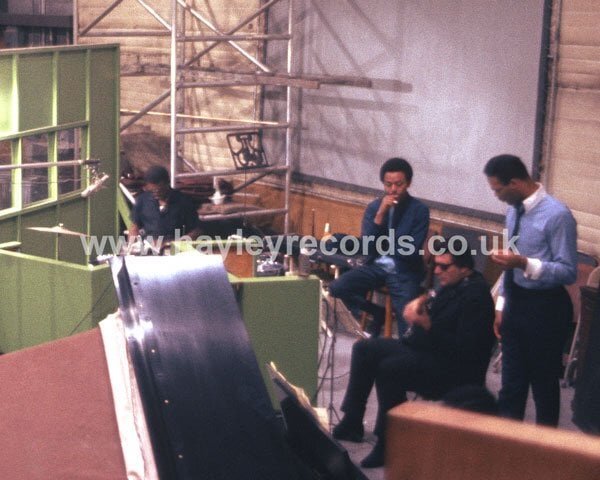
Uriel Jones, Mike Terry, Bob Babbitt and Al Kent at the recording of 'The way you've been acting lately' at United.
The horns, vocal overdubs, mix and disk mastering for Ollie's 'Cool Jerk' were also finished at United Sound. Wolfrum's professional relationship with Ed Wingate was always positive. " I guess he liked me and we always got along well. If we ever had a really big hit, and I did the session, he would shake my hand to thank me but when I let go there would be a big bill in my hand! The first time he did it I was shocked, as you can imagine. He just said ' You did a great job. I made 100 times more than that on that song'." This happened time and again.
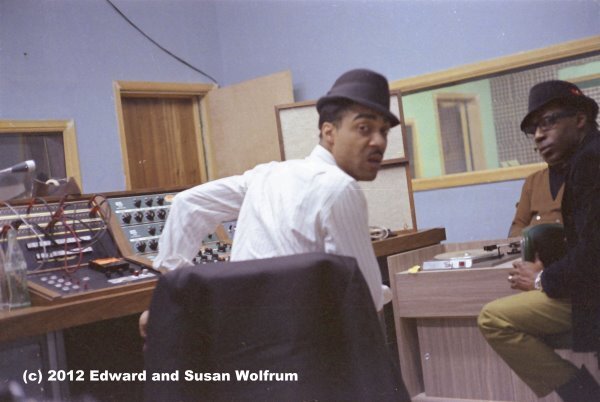
Andre Williams at Theme 1966
By the end of the summer of 1966 Wolfrum had been recruited to join a new company setting up operations down the street from Golden World, at Dexter and Davison. This time it was as 'Chief technical engineer' at Theme Productions Inc., a company specialising in providing jingles, commercials and IDs, among other things, for radio stations across the country. According to owners James Panagos and Carl Porter the company intended to pitch ' ...the Detroit sound against the Dallas sound' with the aid of ' ...the same talent that Detroit agencies are using for many of the top automotive commercials backed with bands of up to 34 musicians.' He has somewhat mixed feelings about his experiences at Theme however. " It started out as B.A.Starr Inc., a company that allowed people to record themselves, but they wanted to expand and enlarge the operation to offer a range of projects to radio stations. We pretty well built the new studio from the ground up, cleaned up and re-wired a mixing board they had purchased and handled all the other installation duties too. They brought Quincy Jones in to write jingles, station IDs and other creative work. Problem was, they didn't know how to syndicate their status around the U.S. Richard Green was working for them when I came in. He later hooked up with Johnny Griffith and began recording some of their own acts at Theme. They had the Soul Twins, the Four Pros and Tony and Tyrone, who all signed recording contracts with Ollie McLaughlin. The owners of Theme didn't understand music production, so I agreed to bring recording session work in for which I would receive bonuses on top of my salary. I brought Andre Williams in to do sessions, Al Kent, Ed Wingate, Ollie and many others. This bought all the Funks (the session musicians from Motown and around) over too. But once things started to take off they started to balk at the bonuses I was receiving. I showed up for a session one day and they had cancelled it. They fired me on the spot and ordered me out of the building. Problem was, all my tools and test equipment were still in the studio and they wouldn't give me access, so I walked downstairs and called the police! They thought they could do music themselves, but once the word got out the sessions dried up. In six months or so they were out of business. The building was burnt down in the '67 riots."
.jpg.0ff18e55dbf215f732e5925b67154664.jpg)
In early Spring of 1967, a few days after his acrimonious split with Theme Productions, Ed Wolfrum received a call from Jimmy Syracuse at United Sound Systems. " He said 'It's about time you joined the big time' and offered me a job as a sound engineer. I was happy to take it. Everyone referred to United as the 'mothership' because they were so far ahead of every other studio and did so many other and varied types of work. Not only music production, but also motion picture mixing, magnetic film transfer, optical sound recording, commercials, industrial sound, jingles, IDs, disk recording, plus a lot of postproduction work. If it involved sound, United could do it." United Sound Systems had been in the same location, on Second Avenue at Antoinette since it's opening in 1933. Jimmy Syracuse had moved to Detroit from New York in the early 1930s with a view to recording the vibrant jazz and blues scene that existed in the city. "He saw the potential market here and set up on his own. Back in the 1920s RCA and Western Electric dominated corporate control of audio. Anyone recording professionally would have to pay a unit fee to them to use their systems, but Jimmy decided to build his own. By setting up United he allowed independent record companies to flourish and really put the city on the map. Later he was instrumental in helping me form my own business, Audio Graphic Services and allowed me to work freelance at United. He also allowed me to continue to do sessions at Motown and, later on technical work at Terra Shirma."
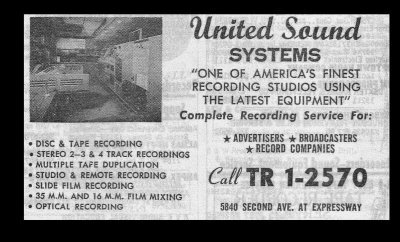
For the next two and a half years Wolfrum flourished at United Sound, finally becoming Chief Engineer in 1969. " I loved working there. Myself and the other engineers would be there at 7A.M. most mornings working on maintenance and preparation for recording. We'd work all day and then I'd go to class at night too working on my degree. If I ever went out of town to engineer sessions, which I did quite often, I would always make sure that all the post production and mastering was done back here at United so that we got the work." Of all the different producers he worked with only a few stood out. " We (at United Sound) were very defensive about our mixing boards and we rarely let producers touch them. At Motown, Mike actually set up a system where the board wouldn't work once we'd closed it down. It was an un-normaled patch bay. This stopped people 'playing' with it and screwing up all the settings we used to record. The only people I would let anywhere near the board on my sessions were Clay McMurray, Smokey, LeBaron Taylor, Don Davis and of course Berry Gordy who did not like to run the console. They were all tremendous producers and they understood how things worked." George McGregor was another great producer as well as being a drummer. He once told me. "I don't want to get into that technical 'shit' - keeping track of the music is hard enough!" Ed's explanation of working practices in Detroit explains the phenomenal amount of material that was produced there. "There was a tremendous work ethic in Detroit that was part of the culture here - that's how we got so much done. We were technical perfectionists and at United all the engineers were allowed to express themselves in their own style. Everyone depended on each other. It was the same with musicians, whether they be the Funks or the Detroit Symphony Orchestra. That's why companies from all over the country came to us."
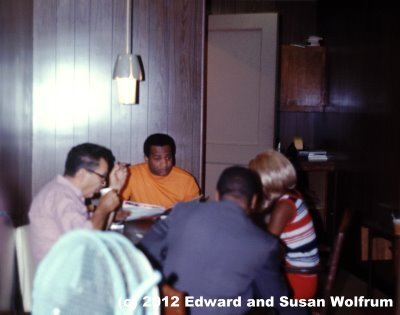
The Famous United Sound Kitchen Jimmy Syracuse, JJ Barnes and others
To accommodate the incredible amount of work that came to United the management added some unusual facilities. " We had a kitchen and eating area, a shower in the basement and several cots (camp beds) that were kept around if sessions ran late and guys had to stay over, especially if there was an early morning session following a late night date. I remember several of the Funks set them up in the main studio and stayed over on more than one occasion. But there was such a strong camaraderie between everyone that it all became part of the fun."
Wolfrum's tenure at United Sound encompassed a wide range of responsibilities and contact with a lot of different people. " People think that we were mainly a commercial music studio but only around a third of the work we did was recording and mixing songs. It wasn't all R & B either.
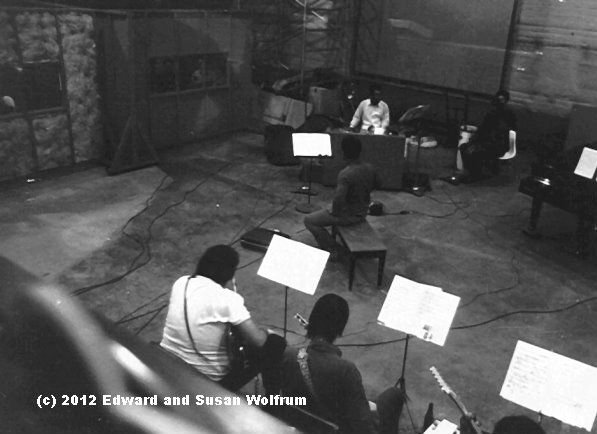
Andrew - Funks at United circa 1969
We did rock, pop, country, classical. We had major companies bringing their artists in to record at United. MGM, RCA, Columbia, Brunswick and many others booked studio time. Jackie Wilson recorded 'Higher and Higher' with the Funks at United with Joe Siracuse engineering and there were many more. When Mike Terry became A & R Director for Epic Records he brought his artists to United. People like Mikki Farrow, Johnny Robinson, Sandra Phillips and others. We even had Henry Mancini in to do an album with the Funk Brothers. It sounded good but his company thought it was too wild for his fan base so they didn't release it. Danny Dallas, a great mixer, tended to do the rock and pop dates whereas I did the R&B, orchestral and film stuff. The large studio at United had a full size projection screen where the guys played scores to picture.
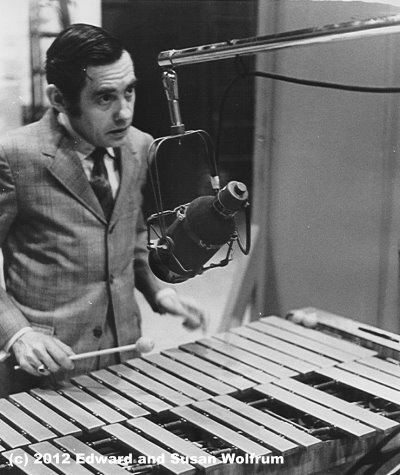
Brokensha at United-1968
An Australian vibe player, who played with the Funks, named Jack Brokensha did a lot of that score writing stuff. He liked to use the Funks. They could make chicken salad out of chicken shit. And they could play anything. I remember when Jim Webb came up from the coast (Los Angeles) because he had heard a lot about them. He gave them this complicated arrangement that he never thought they would be able to play. Within 20 minutes or so they had nailed it! The look on his face was priceless. They were consistent too. Most songs, they would run through for a couple takes and by the third take we were done - best musicians I've ever worked with. And it didn't matter whether you gave them a symphony or a sound bite, they would play it perfectly." A typical day for the musicians usually began in the morning at United Sound " We tended to do jingles and some music production in the morning so that they wouldn't get caught by Berry. We'd maybe do film or jingle overdubs with them too, before they headed over to Motown for sessions there. After that they may go over to Artie Fields studio, to do commercials, or to GM Photographic to work on industrial soundtracks. In the evening they might come back to United or go to Golden World or Terra Shirma, or wherever the session was, to do more recording work. Some of them even went to play in clubs after that too. Those guys made more money from the commercials, jingles and soundtrack stuff than they did from straight music production. They liked doing industrial soundtracks best because it was the most challenging ...and they got paid well on that stuff. United liked it too, as record companies usually paid 90 days later while the film guys paid straight away."
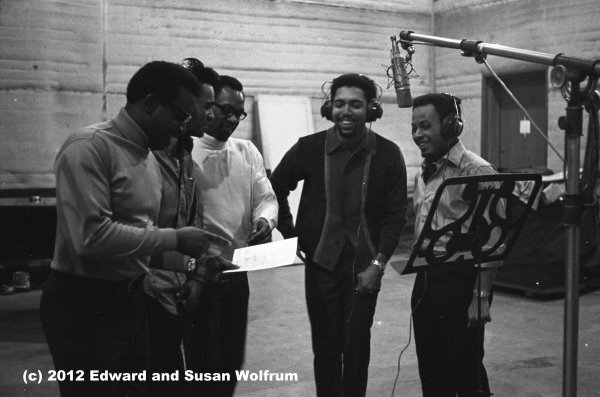
The Precisions at United
The sheer volume of recording sessions taking place at the various studios around Detroit inevitably meant that not all recordings saw the light of day. "In my time I don't think we released more than about ten per cent of what we recorded, for any of the companies, including Motown. They have got hundreds, probably thousands of things in their vaults that weren't put out, and it was the same for most of the others. We always recorded more than we needed so that we could choose the best for a single release or pick the best ones for an album." A flick through Wolfrum's extended library of unreleased material that he recorded or mixed, now amassed on computer files, reveals a mouth watering selection of material from people like Rose Battiste, Parliaments, Deon Jackson, Herman Griffin, Barbara Lewis, Capitols plus hundreds more, as well as scores of backing tracks, that are of a fantastically high standard, and that, sadly, will probably never gain a release. His other passion, during the same period, was photography and here again, his meticulous record of names and faces is captured for posterity. "
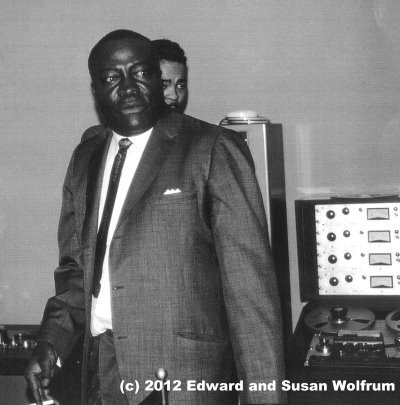
Wingate at Theme Productions
From 1965 on I would always have a camera with me and try to take as many shots in the studio as I could." Among the thousands of photographs amassed, is a shot of an individual well known to everyone on the Detroit recording scene at the time, but almost completely visually anonymous to music aficionados today - Ed Wingate. " Even though everyone knew him, he wouldn't have his photograph taken. I don't even think he knew I'd taken this one. It was at Theme productions during one of his Ric Tic sessions. That's Al Kent behind him. It's funny but Berry Gordy was similar over at Motown. He didn't let many people in to film or take photographs. I don't know what he was trying to hide." Another shot of particular interest is a photograph of Paul McCartney sitting on a stool at Theme productions, intently watching Bob Babbitt play bass on the 'Please operator' session. "He was quite young then, but he was fascinated by the bass playing here in Detroit and dropped by to watch, and listen, for himself. I think it was a spy mission as I know the were trying to figure out how we got the bass sound." The true value of the collection however, is to finally see what significant people, particularly behind the scenes, actually looked like. Producers and arrangers like Dale Warren, Sonny Sanders, Al Kent, Mike Terry, Duke Browner, Robert Green, Bob Hamilton, Johnny Griffith, William Garrett, to name but a few, who were only previously seen on record labels, are revealed.
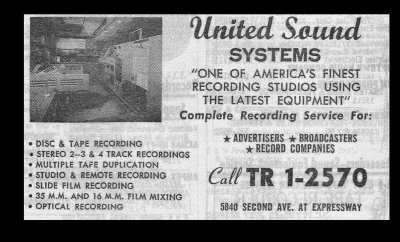
The significance of United Sound Studios, and Ed Wolfrum's contribution, to the recording of two of the most creative albums of the late 1960s and early 1970s has passed into folklore. The original concept and basic track recording for Isaac Hayes' second album 'Hot buttered soul' was in place when Don Davis brought the project to United in June 1969. " The album was a departure from what Isaac Hayes, or anyone else for that matter, had come up with in the past. Each track was much longer and had quite long periods of orchestration. It was quite a challenge. All the string and horn parts were cut here so we used the Powerhouse horns, who were a lot of the guys who'd played at Motown and many with the Detroit Symphony Orchestra. We used a pre delay reverberation technique to the large space they wanted, which was pretty revolutionary. Artie Fields had been using it for commercials since the late 1950s. I used it on Marvin's 'What's Going On' album later, too. I got the chance to work with Isaac, and his partner David Porter, which was fun. The vocals and the final mix on Hot Buttered Soul were done by Russ Terrana over at Terra Shirma." The album achieved phenomenal success for the Stax label and vaulted Hayes to international stardom. The other highly significant project recorded at United in the period, 'What's Going On', was initiated in vastly different circumstances. " The A & R Director at Motown, Harry Balk, put his job on the line to get this album recorded. He believed in the quality and hit potential of the album Marvin Gaye had come up with, but, rightly, suspected that Berry Gordy wouldn't have authorised it. Berry didn't want artists producing their own material because it didn't fit in with his way of doing things. He also didn't want Motown to be associated with 'Social commentary' projects. He thought they were too controversial. So the songs were recorded off site, at United, so that he wouldn't be aware. Problem was, in the middle of production, he found out. Berry wanted to cancel it immediately but Harry Balk managed to convince him to let it go ahead. He offered to resign if the album didn't become a huge commercial success so Berry finally let us finish it and Motown put it out. Harry Balk did another smart thing during that time too. He was so sure of the album's success that he ordered a large pressing run of that album, to handle the anticipated demand ...and he was proved right." And the beat goes on...
Doctor Edward J Wolfrum's contribution to music production, sound engineering, binaural technique, audio enhancement and development is extensive. His benevolence in sharing his experiences, recollections and factual references to the music produced in such a special place, at such a special time, is invaluable. As a man, his untiring and unsurpassed dedication to all the passions in his life, make him a truly unique and outstanding individual.
Rob Moss 2012
http://www.hayleyrecords.co.uk
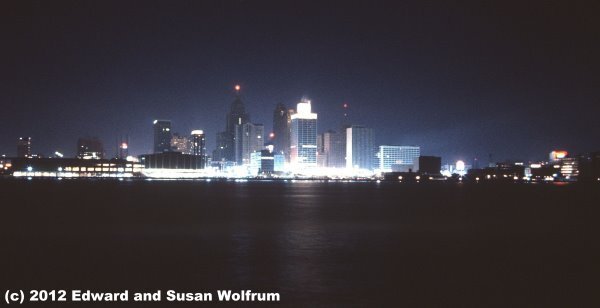
Detroit From The River 1966
Related Soul Source Articles
-
 1
1
-
 1
1


Recommended Comments
Get involved with Soul Source
Add your comments now
Join Soul Source
A free & easy soul music affair!
Join Soul Source now!Log in to Soul Source
Jump right back in!
Log in now!